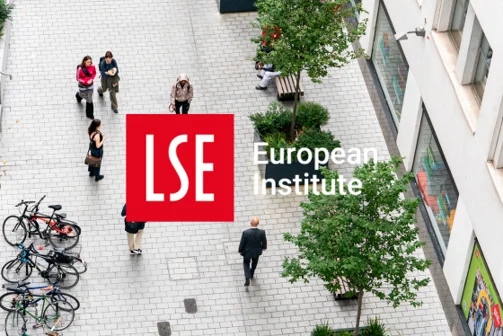Overview
Introduction
Bocconi University and LSE are proud to offer high-achieving MSc students this joint programme in European and International Public Policy and Politics. The programme is delivered by world-renowned experts in the field and is split across two years of study.
In the first year, you'll attend Bocconi University in Milan and take part in the MSc Politics and Policy Analysis programme. In the second year, you'll be at the European Institute at LSE, studying the MSc European and International Politics and Policy.
Delivered by world-leading experts, the curriculum of the programme focuses on European politics and policymaking in a global context. You'll have the opportunity to take elective courses that critically assess Europe's role in the world, covering various social science fields such as political science, international relations, economics, and social policy.
This programme provides students with a unique opportunity to gain comprehensive knowledge in the field of European and International Public Policy and Politics while studying at two of the most prestigious institutions in the world.
The programme is conducted entirely in English, but you will also be expected to acquire knowledge in other languages as part of your Bocconi degree requirements.
Preliminary readings
The following reading list indicates the range of literature you'll encounter on the programme. You're encouraged to read some of them before you arrive.
- Putnam, R. (1988). Diplomacy and domestic politics: the logic of two-level. In International Organizations, 42(3), pp. 427-460.
- Tsebelis, G. (2002). Veto Players: How Political Institutions Work. Princeton University Press.
- Pollack, M. (2015). Theorizing EU Policy-Making. In Wallace et al. (Eds). (2015). Policy-making in the European Union. Oxford: OU
- P.Moravcsik, A. (1998). The Choice for Europe: Social Purpose and State Power from Messina to Maastricht. Cornell University Press.
- Hagemann, S., Bailer, S. and Herzog, A. (2019) ‘Signals to their parliaments: governments’ strategic use of votes and policy statements in the Council of the European Union’, Journal of Common Market Studies, 57(3), pp.634-650.
- Boerzel, T., Hofmann, T. Panke, D. and Sprungk, K. (2010). Obstinate and Inefficient: Why Member States Do Not Comply With European Law. In Comparative Political Studies, 43(11), pp. 1363-1390.
- Keohane, Robert. (2005). After hegemony: cooperation and discord in the world political economy. Princeton: Princeton University Press.
- Schneider, C. and Slantchev, B. (2018). The Domestic Politics of International Cooperation: Germany and the European Debt Crisis. In International Organization, 72(1), pp. 1-31.
- Hobolt, S. (2016). The Brexit Vote: A Divided Nation, A Divided Continent. In Journal of European Public Policy, 23(9), pp. 1259-1277.
- De Vries, C. (2018). Euroscepticism and the Future of European Integration. Oxford: OUP.
Entry requirements
Upper second-class honours (2:1) degree or equivalent, preferably in a social science subject.
Italian students who attended an Italian university other than Bocconi University for their bachelor's degree must also submit a GMAT (or GRE) test, see Bocconi University website for more details.
Please select your country from the dropdown list below to find out the entry requirements that apply to you.
Overseas
English language requirements
The English language requirement for this programme is Higher. Read more about our English language requirements.
Competition for places at LSE is strong. So, even if you meet the minimum entry requirements, this doesn't guarantee you an offer of a place.
However, please don’t feel deterred from applying – we want to hear from all suitably qualified students. Think carefully about how you can put together the strongest possible application to help you stand out.
Programme content
You'll complete two full academic years in total (one each at Bocconi and LSE). The programme also includes the writing of a Dissertation or Applied Policy Project, which will be prepared and assessed at LSE in year two. Students will prepare additional materials and defend their research at Bocconi; for this work Bocconi will give a separate grade. You'll also undertake a relevant professional internship, organised by Bocconi, of at least ten weeks duration, before you register at LSE.
Year 1
First year, at Bocconi
The first year is spent at Bocconi University. You'll join the MSc in Politics and Policy Analysis, on their own track. You're also required to study languages and undertake an internship.
Indicative courses include:
- Methods and Tools for Public Policy Analysis
- Public Administration, Economics and Politics
- Law and Policy Making.
Year 2
Second year, at LSE
The second year runs from September until September of the following year. You'll join the MSc European and International Politics and Policy, on their own stream. In addition to the compulsory and semi-compulsory courses, you'll choose options from a range available within the European Institute, as well as other relevant areas such as politics. In addition, you'll complete a Dissertation or Applied Policy Project.
Courses to value of one and half units from a range of options
Why study with us
Discover more about our students and department.
Meet the department
The European Institute is a multidisciplinary centre for the study of European politics, economics and culture.
Founded in 1991, the institute is the UK's leading centre for the study of Europe, offering a range of master’s programmes and an extensive MPhil/PhD programme. Every year, we welcome more than 200 master’s and 30 doctoral students from all regions of the globe.
Our research spans four key themes – political economy, politics and policy, culture and society, and migration. Teaching and research draw on the expertise of staff from many different disciplines across LSE, including politics, economics and sociology.
The institute is outward facing. We run dozens of events each year, with workshops, seminars and presentations, welcoming high-profile speakers, including former presidents, prime ministers, foreign and finance ministers, distinguished scholars and influential commentators.
Internationally, we’ve forged close links with several partner institutions, including Sciences Po (Paris), Bocconi University (Milan), Fudan University (Shanghai), and Columbia University (New York) with whom we run double master’s programmes.
Why LSE
University of the Year 2025 and 1st in the UK in 2025 and 2026
Times and The Sunday Times - Good University Guide 2025 and 20261st in London for the 14th year running
The Complete University Guide - University League Tables 20266th in the world for the study of social sciences and management
QS World University Rankings by Subject 20256th in the world for leading the way in social and environmental sustainability
QS World University Rankings: Sustainability 2026Your application
Overview
If your application is successful, you'll also be expected to complete a free application via the LSE system so that you can provide relevant copies of required documentation.
We welcome applications from all suitably qualified prospective students and want to recruit students with the very best academic merit, potential and motivation, irrespective of their background.
Applications are administered by a joint admissions board of representatives consisting of both LSE and Bocconi University. Successful applicants will be notified by email. We suggest that you stress both on your Dossier and Motivation all the quantitative aspects of your profile in order to be more competitive for this specific programme.
Supporting documents
In addition to the submitting the application form, you must also submit the following documents as part of the application process:
- a full and official transcript of marks obtained for each year of university level education, including the current year when available
- a certified copy of your undergraduate degree (if applicable). Documents written in languages other than English must be accompanied by a certified translation
- a statement of academic purpose to be submitted in English. In no more than 1,000 words, describe your background, your career objectives as these relate to Europe/the EU, and how obtaining the LSE/Bocconi Double Degree will help you to achieve those objectives
- two letters of academic recommendation. These should be English, or be accompanied by a certified translation. They must be submitted online - instructions are provided on the admissions portal.
- a Dossier in English
- optional: you may also submit letters of professional recommendation.
You may need to provide evidence of your English language proficiency. See our English language requirements.
Data sharing
Double degrees and certain other degrees and scholarships require that LSE shares personal data with another university or partner. In our agreements we will use the School’s standard data sharing template for universities and partners in the EU and EEA and in an adequate country. Standard contract clauses will be used for any other country. If you have any questions about this or how your personal data will be treated by LSE, please contact the Data Protection Officer via glpd.info.rights@lse.ac.uk or check our Student Privacy Notice.
Fees and funding
The table of fees shows the latest tuition fees for all programmes.
You're charged a fee for your programme. At LSE, your tuition fee covers registration and examination fees payable to the School, lectures, classes and individual supervision, lectures given at other colleges under intercollegiate arrangements and, under current arrangements, membership of the Students' Union. It doesn't cover living costs or travel or fieldwork.
Home
Year 1 (at Bocconi, 2026/27):
Home students: See Bocconi fee
Year 2 (at LSE, 2027/28):
Home students: £30,400 provisional
Overseas
Year 1 (at Bocconi, 2026/27):
Overseas students: Bocconi fee
Year 2 (at LSE, 2027/28):
Overseas students: £32,000 (provisional)
Learning and assessment
How you learn
How you're assessed
All taught courses are required to include formative coursework, which is unassessed. It's designed to help prepare you for your summative assessments, which count towards the course mark, and to the degree award. LSE uses a range of formative and summative assessments, such as essays, problem sets, case studies, reports, quizzes, exams, online assessments and many others. Summative assessment may be conducted during the course or by final examination at the end of the course. An indication of the formative coursework and summative assessment for each course can be found in the relevant course guide.
Graduate destinations
Overview
Graduates of the programme can expect to pursue successful careers in politics, journalism, diplomacy, business, academia and consultancy, in the EU institutions, national administrations and the international institutions.
Further information on graduate destinations for this programme
Median salary of our graduate taught students 15 months after graduating:
Top 5 sectors our students work in:
Career support
From CV workshops through to careers fairs, LSE offers lots of information and support to help you make that all-important step from education into work.
Many of the UK’s top employers give careers presentations at the School during the year and there are numerous workshops covering topics such as job hunting, managing interviews, writing a cover letter and using LinkedIn.
See LSE Careers for further details.

